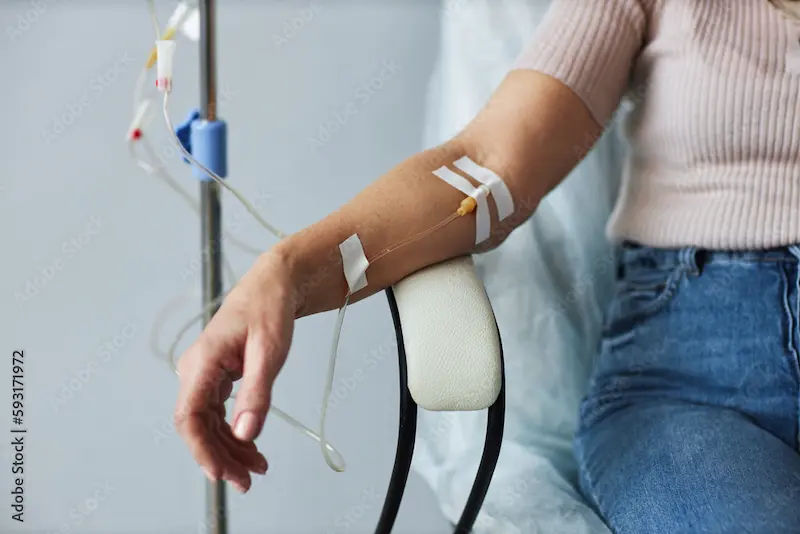How Immunotherapy is Administered for Cancer
Know about immunotherapy, its administration, how it is administered, possible side effects, tips on how to manage them and when to see a doctor and more.


Introduction
Cancer treatment has come a long way, and one of the most promising advances is immunotherapy. Unlike chemotherapy or radiation, which directly attack cancer cells, immunotherapy works by boosting your body’s own immune system to fight cancer more effectively.
If you or a loved one is considering immunotherapy, you may wonder: How is it given? What does the process look like? This guide explains everything in simple terms so you can feel more informed and confident about your treatment journey.
What Is Immunotherapy?
Immunotherapy is a type of cancer treatment that helps your immune system recognize and destroy cancer cells. Since cancer can sometimes "hide" from the immune system, immunotherapy acts like a booster, making your body’s defenses stronger and smarter.
Common Types of Immunotherapy
1. Checkpoint Inhibitors – Help immune cells recognize and attack cancer.
2. CAR T-Cell Therapy – Modifies your immune cells to target cancer.
3. Monoclonal Antibodies – Lab-made proteins that attach to cancer cells.
4. Cancer Vaccines – Train the immune system to fight cancer.
5. Cytokines – Proteins that boost immune response.
Now, let’s understand how these treatments are given.
Consult a top cancer specialist for the best advice
How Is Immunotherapy Administered?
The way immunotherapy is given depends on the type of treatment and the kind of cancer being treated. Here are the most common methods:
1. Intravenous (IV) Infusion (Most Common Method)
What happens? The medicine is delivered directly into your bloodstream through a vein, usually in the arm.
Duration: Can take 30 minutes to a few hours, depending on the drug.
Frequency: Given in cycles (e.g., every 2-4 weeks).
Where? In a hospital, clinic, or specialized cancer center.
2. Oral Pills (Less Common)
Some immunotherapy drugs come in pill form, taken at home.
Example: Certain targeted therapies.
Requires strict adherence to dosage schedules.
3. Topical (For Skin Cancer)
A cream is applied directly to the skin (e.g., for early-stage skin cancer).
Used for superficial cancers like basal cell carcinoma.
4. Injection (Under the Skin or Into a Tumor)
Some immunotherapies are injected under the skin (subcutaneous) or directly into a tumor (intratumoral).
Example: Interleukin-2 (IL-2) for melanoma or kidney cancer.
5. CAR T-Cell Therapy (Specialized Treatment)
Your T-cells are collected, modified in a lab, and then infused back into your body.
Used for blood cancers like leukemia and lymphoma.
What to Expect During Treatment?
It is divided into three stages, as given below:
Before Treatment
Your doctor will run tests (blood work, scans) to check if immunotherapy is right for you.
You may need pre-medications to prevent side effects.
During Treatment
If getting an IV infusion, you’ll sit comfortably in a chair while the medicine drips slowly.
Nurses will monitor you for any reactions.
You can read, watch TV, or rest during the session.
After Treatment
Some people feel tired afterward.
You may need follow-up scans to check progress.
Side effects (if any) are usually manageable.
Possible Side Effects & How to Manage Them
Immunotherapy is generally well-tolerated, but like all treatments, it can cause side effects. These happen because your immune system becomes overactive.
Common Side Effects
Fatigue – Rest, light exercise, and good nutrition help.
Skin Rash/Itching – Moisturizers and prescribed creams can ease discomfort.
Diarrhea or Nausea – Stay hydrated; your doctor may prescribe medication.
Fever or Chills – Over-the-counter fever reducers may help (check with your doctor).
Tips for a Smoother Immunotherapy Journey
1. Stay Hydrated – Helps flush out toxins.
2. Eat a Balanced Diet – Supports immune function.
3. Get Light Exercise – Gentle walks can reduce fatigue.
4. Rest When Needed – Listen to your body.
5. Keep Follow-Up Appointments – Regular check-ups ensure the treatment is working.
Is Immunotherapy Right for You?
Immunotherapy doesn’t work for all cancers or all patients, but it has shown great success in treating:
Melanoma
Lung cancer
Kidney cancer
Lymphoma
Bladder cancer
Your oncologist will determine if immunotherapy is a good option based on:
Your cancer type and stage
Previous treatments
Overall health
Final Thoughts
Immunotherapy is a powerful tool in the fight against cancer, offering hope where traditional treatments may not work. While the process may seem overwhelming, knowing what to expect can make the journey easier.
Consult a top cancer specialist for the best advice
Consult a top cancer specialist for the best advice

Dr. Rupam Manna
Radiation Specialist Oncologist
7 Years • MBBS MD(RADIO THERAPY), CCEBDM
Barasat
Diab-Eat-Ease, Barasat

Dr. Sanchayan Mandal
Medical Oncologist
17 Years • MBBS, DrNB( MEDICAL ONCOLOGY), DNB (RADIOTHERAPY),ECMO. PDCR. ASCO
Kolkata
MCR SUPER SPECIALITY POLY CLINIC & PATHOLOGY, Kolkata

Dr Gowshikk Rajkumar
Oncologist
10 Years • MBBS, DMRT, DNB in Radiation oncology
Bengaluru
Apollo Clinic, JP nagar, Bengaluru

Dr Devashish Tripathi
Radiation Specialist Oncologist
20 Years • MBBS, PLAB, MRCP (UK)- General Medicine, FRCR (Oncology), Certificate of Completion of Training (CCT)- Clinical Oncology
Delhi
Apollo Hospitals Indraprastha, Delhi

Dr. Harsh J Shah
Surgical Oncologist
15 Years • MS, MCh (GI), DrNB (GI)
Ahmedabad
Apollo Hospitals Gandhinagar, Ahmedabad



